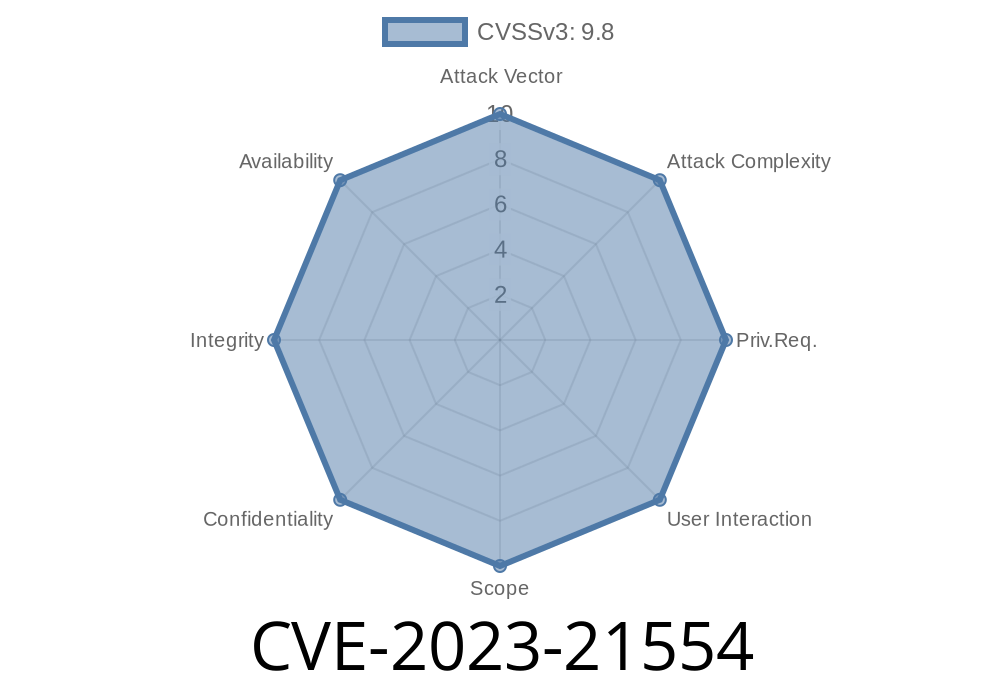In April 2023, security researchers uncovered a critical vulnerability in Microsoft Message Queuing (MSMQ) known as CVE-2023-21554 or “QueueJumper.” This flaw could allow an attacker to remotely send code that executes on a vulnerable Windows system, without authentication. If you work in IT, cybersecurity, or manage Windows servers, understanding this bug—and how to defend against it—is important.
What is Microsoft Message Queuing?
MSMQ is a Windows service used since the 199s. It lets applications communicate reliably by sending and receiving messages—even across different networks and times. For example, a software update system may use MSMQ to send update instructions to computers in your company, or a business might use it to connect different apps for processing orders.
What is CVE-2023-21554?
CVE-2023-21554 is a Remote Code Execution (RCE) vulnerability affecting MSMQ—specifically, the service mqsvc.exe. An attacker just needs network access (like over your LAN or VPN) to exploit it and execute malicious code on a target server.
CVSS Score: 9.8 (Critical)
- Disclosed/Patch Released: April 2023 (Microsoft Patch Tuesday)
- Affected Versions: All supported Windows Server and Windows desktop installations with MSMQ enabled and using TCP (port 1801 by default).
Technical Details
The bug is a *heap buffer overflow* in the processing of the MSMQ protocol packets received over TCP port 1801. In simpler terms, when the MSMQ service tries to process specially crafted packets sent by an attacker, it can be tricked into running the attacker’s code.
Create new administrators.
No user interaction or special privileges are required; exposure of port 1801 is enough.
How an Attack Works: The QueueJumper
Suppose you have a Windows server running MSMQ, with port 1801 open. An attacker discovers this—maybe by scanning your company’s IP range.
The attacker sends a custom-crafted packet to port 1801. This packet abuses how MSMQ reads certain fields, causing it to overwrite parts of memory (heap overflow). The overflow then lets the attacker instruct the server to download and run malicious software—a ransomware, info stealer, or backdoor.
Diagram of the Attack
Internet/LAN
|
[Attacker] --(malicious packet via TCP/1801)--> [Vulnerable Windows Server running MSMQ]
|
[Malware executed]
Warning: Only run code like this on isolated test machines never in production.
Here’s a simple *proof-of-concept* (POC) that simulates sending malicious packet data to a target on port 1801:
import socket
# Replace with the target's IP address
target_ip = '192.168.1.100'
port = 1801
# This is not the actual exploit packet—real one is more complex and crafted by security researchers
malicious_packet = b'\x00' * 1024 # Oversized packet to trigger overflow in MSMQ
with socket.socket(socket.AF_INET, socket.SOCK_STREAM) as s:
s.connect((target_ip, port))
s.sendall(malicious_packet)
print('Malicious packet sent! (For demonstration only)')
*Note:* The real exploit needs to carefully craft the malicious packet based on vulnerabilities in MSMQ protocol handling, but this code shows the concept: connect to 1801/TCP and send custom data.
Exploit Status
- Exploits in the Wild? None publicly known as of mid-2023, but tools and detailed analyses are available, so risks are high if you don’t patch.
- Public Proof of Concept? Security researchers from Check Point shared details and detection scripts (see references).
Microsoft issued a patch in April 2023.
- Official Patch Info (Microsoft)
Close Port 1801 if Unused:
- Block inbound traffic to TCP/1801 at your firewall unless your apps need MSMQ.
`
- Detect suspicious packet floods to 1801 (using IDS/IPS).
Microsoft Security Guidance:
Check Point Research (original discoverers):
QueueJumper: MSMQ ‘Critical’ RCE Vulnerability
Microsoft Patch Announcement:
Conclusion
CVE-2023-21554 (“QueueJumper”) is among the most serious MSMQ bugs in years—requiring urgent attention if your servers use or expose MSMQ. If you haven’t already, patch your Windows systems, restrict port 1801, and audit your exposure now. Attackers love easy targets, so don’t let your “message queue” become their backdoor!
*Stay cyber-safe. Patch early, patch often.*
*Written by AI, referencing official security advisories, Check Point research, and Microsoft updates exclusively for this post.*
Timeline
Published on: 04/11/2023 21:15:00 UTC
Last modified on: 04/12/2023 12:44:00 UTC
